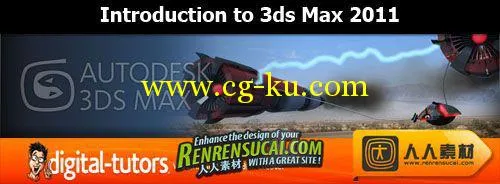Digital-Tutors : Introduction to 3ds Max 2011
English | VP6F 782x646 | MP3 96 kbps | 3.34 GB
部分章节视频预览:
In this course we'll cover a wide range of topics in order to get you quickly up to speed using 3ds Max 2011.
In this course we are going to help you get a good understanding of how to work in 3ds Max.You will be able to learn from several of the instructors here at Digital Tutors as we go through many of the major parts of the software. We are going to cover a wide range of topics in this course. We will start out exploring the user interface and finding our way around 3ds Max. Then we will start to create our own custom model, a pod racer, using a number of powerful modeling tools. We will paint and texture our model, and then take it through the process of rigging and animation. We will finish up by adding dynamic effects to the scene and rendering out a nice result. Once you are finished, you will have exposure to a wide range of disciplines in 3ds Max and be able to start working on your own projects and building on the knowledge you have gained.
Lesson Outline (89 lessons)
1. Introduction and Project Overview
3. Navigating the viewports
5. Creating your first object
7. Viewing Geometry
9. Saving Files and File Types
11. Modeling Overview
13. Finishing the engine shell
15. Using splines and modifiers to add sharp panels
17. Building the back of the engine with NURBS
19. Building the engine nozzle
21. Building the side fine and cable connector
23. Building the back of the pod
25. Modeling the main cockpit
27. Using splines to build detail around the cockpit
29. Adding final detail to the racer
31. Adding cables to the racer
33. Using the Material Editors
35. Adding Gradient Ramps
37. Adding preset materials
39. Working with UVs
41. Adding bump maps
43. Combining textures with the Composite Map
45. Adding a glow to the model
47. Building controls for the pod racer
49. Organizing the scene with the Layer Manager
51. Modifying an object's pivot
53. Wiring parameters
55. Using an expression to automate an engine idle
57. An overview of 3ds Max's Bone Tools and the Spline IK Solver
59. Correcting the deformations of the cables
61. Make the rig more animator-friendly
63. The basics of setting keyframes in Max
65. Cycling animations in Max
67. Animating with Autokey
69. Previewing animations in real-time
71. Adding initial particle dynamics to our pod racer
73. Setting up initial shading for smoke particles
75. Duplicating particle emitters in 3ds Max
77. Creating control objects for the animated lightning bolt
79. Lighting and Rendering Overview
81. Exploring the parameters of 3ds Max lights
83. Working with Shadow Maps in 3ds Max
85. Matching 3ds Max camera to a live-action background
87. Matching lights to a photographic environment
89. Rendering an animated sequence from 3ds Max
2. Overview of the User Interface
4. Using the Command Panel
6. Transforming objects
8. Working with the modifier stack
10. Working with projects
12. Building the basic shape of the engine shell
14. Detailing the engine shell using existing geometry
16. Adding the fan blades using an Array
18. Modeling a series of pipes
20. Building the power coupling with splines
22. Adding bolts using Object Paint
24. Building the base of the pod
26. Adding the back of the cockpit
28. Modeling the lower racer structure
30. Modeling the front fins with splines
32. Materials and Texturing Overview
34. Applying materials
36. Applying multiple materials to objects
38. Working with procedural texture maps
40. Working with bitmap textures
42. Modulating specular color
44. Using the Viewport Canvas
46. Rigging and Animation Overview
48. Finishing the pod racer's controls
50. Working with the Schematic View
52. Creating custom parameters
54. Writing your first expression
56. Rigging the engine cables with bones
58. Finishing the cable rig
60. Randomizing the engine idles with the Noise Float controller
62. Locking controllers and Finishing the pod racer rig
64. Understanding the Curve Editor
66. Animating objects along a path
68. Editing keys on the Track Bar
70. Dynamics Overview
72. Adding forces to 3ds Max particles
74. Finalizing the shading network for our smoke particles
76. Starting to create an animated lightning bolt in 3ds Max
78. Finalizing the movement and the materials for the lightning bolt
80. Overview of the various 3ds Max light types
82. Switching the 3ds Max rendering engine
84. Using Raytrace shadows in 3ds Max
86. Rendering photographic environments in 3ds Max
88. Using the 3ds Max Skylight to create secondary lighting



发布日期: 2010-12-22